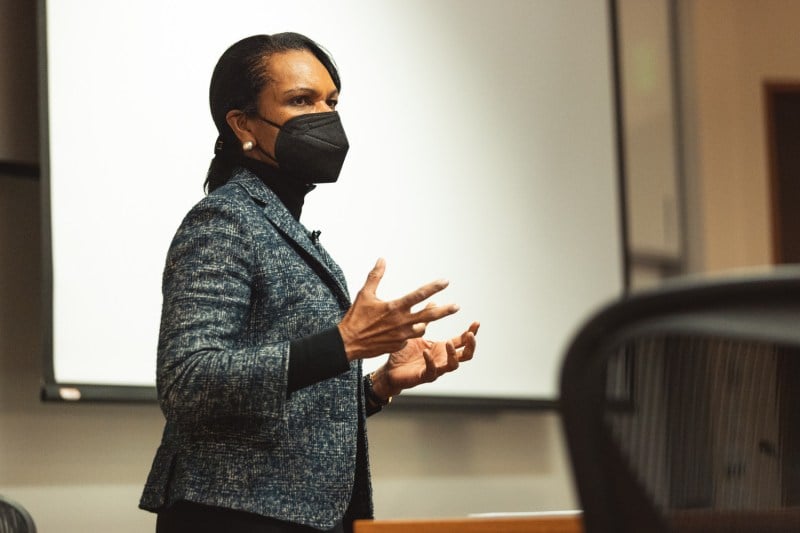Faculty Senate representatives and Hoover Institution senior fellows are working on increased communication to repair their frayed relationship, according to a presentation from Provost Persis Drell and Hoover Institution Director Condoleezza Rice at the Faculty Senate’s Thursday meeting.
At the same meeting, the Faculty Senate approved a bill that will allow courses with a Satisfactory/No Credit (S/NC) grading basis to become eligible for Ways of Thinking/Ways of Doing certification. President Marc Tessier-Lavigne also dedicated time to reflect on Putin’s invasion of Ukraine and the Stanford Ukrainian community.
“The peace established in Europe after World War II, while not complete or unbroken for now, has nevertheless stood as a pillar of stability,” said Tessier-Lavigne. “The launch of a major land war in Europe is an extraordinary and shocking event of historic proportions.”
Drell and Rice’s presentation at the meeting marked the culmination of nearly a year of strained relations between some members of the Faculty Senate and Hoover. Controversy surrounding Scott Atlas — a former White House advisor for President Donald Trump and Hoover Institution senior — and his controversial policy recommendations such as suggesting defeating the pandemic by way of “herd immunity,” increased tensions between the Faculty Senate and Hoover.
In September 2020, over 100 faculty members signed an open letter asking the Faculty Senate to reconsider its relationship with Hoover. By October, some members of the Faculty Senate advocated for the University to distance itself from Hoover. A month later, following Atlas’ social media encouragement for Americans to disregard mask-wearing and for residents of Michigan to “rise up” against Governor Gretchen Whitmer, the Faculty Senate condemned Atlas and debated whether Stanford should investigate him for possible ethical violations.
In summer 2021, members from both groups met over three dinners to share their perspectives on how to balance academic freedom with the responsibility of Stanford faculty to affect people and policies in ways that benefit society as per Stanford’s mission. According to Drell, Hoover leaders and faculty representatives who participated in dinner discussions during the past year came to a general consensus that free speech is inhibited to a degree in the Stanford culture, and that “discourse on campus was less civil than desirable.”
“There was a lot of conversation around the classroom and what goes on in the classroom and that both students and faculty were fearful of expressing thoughts and views,” Drell said. “No one felt that was healthy. No one had a clear path out necessarily, but it was a very good discussion to listen to and I felt that it was very helpful.”
Rice also presented Hoover’s plans to clarify its purpose and expand its interactions with the Stanford community, particularly through increased communication with Stanford’s science community: “I think Hoover is relatively well known among the social science departments and the business school and law school, but scientists don’t know us very well,” Rice said.
Hoover will also update its website, working to distinguish evidence-based research from commentary, according to Rice. Rice made clear, however, that she did not intend to discourage fellows from providing commentary and opinions on issues, and that she hopes Hoover will provide great contributions to academic discourse at Stanford.
“We very much want to participate in and be a part of a lot of discussion that’s going on about civil discourse in the university,” Rice said.
The Faculty Senate also approved a bill to allow S/NC courses to be considered for Ways certification. Previously, the only courses that could be considered for Ways certification with a S/NC grading basis were those that fulfilled the Creative Expression requirement.
Vice Provost for Teaching and Learning Sarah Church said the legislation was motivated by the physics department’s decision to institute mandatory S/NC grading for its three introductory sequences during the pandemic. The department reinstated letter grades at the start of the academic year, but it plans to return to mandatory S/NC grading this coming fall. As a result, these courses — some of which fulfill the Formal Reasoning and Scientific Method and Analysis Ways requirements — would no longer fit within the Ways program.
Church, who previously served as physics professor, added that the department’s decision to make the introductory sequences S/NC had been in the works before the pandemic. A concern for grades led some students to take introductory courses that were less difficult than what they were eligible for, and in those courses, students’ engagement with the course content would be disappointingly low, according to Church.
Some senators asked if the physics department’s decision to pursue S/NC grading for their introductory courses should lead other departments to consider similar action.
“I wonder whether you think this is the beginning of a much broader discussion and consideration of the meaning of grades,” asked English and American literature professor Gavin Jones.
Others questioned whether the decision to allow courses with S/NC outside of the CE exemption to be eligible for Ways certification was being made too quickly.
“I’d be very enthusiastic about this if there was an experimental period of two or three years,” said Hoover Institution Senior Fellow and economics professor Michael Boskin. “If there was a quantitative study done about what actually happened. And rather than reversing three years out, we just don’t renew it — and we have that choice.”
Despite the misgivings aired by some senators, the Faculty Senate unanimously approved the bill.
